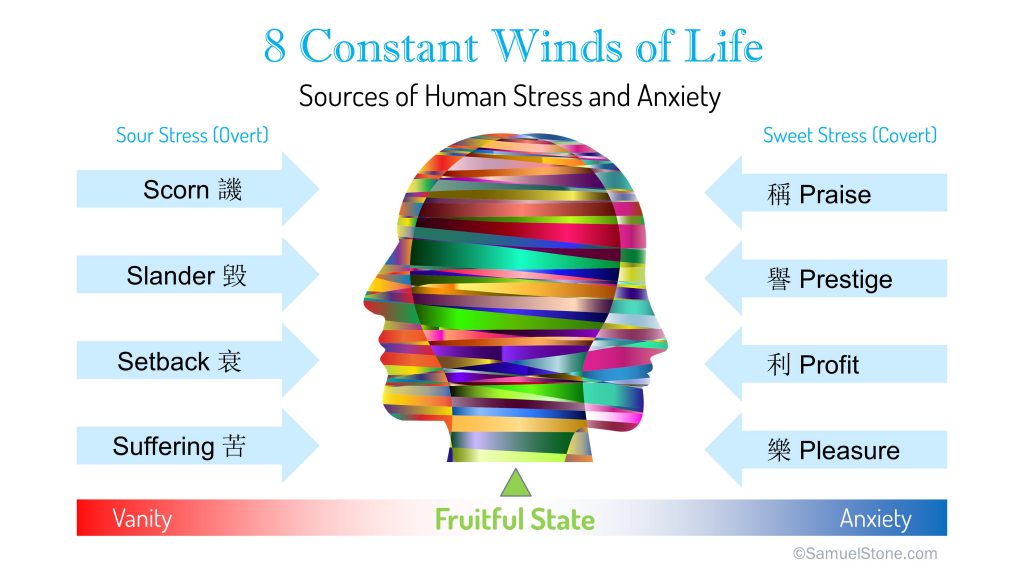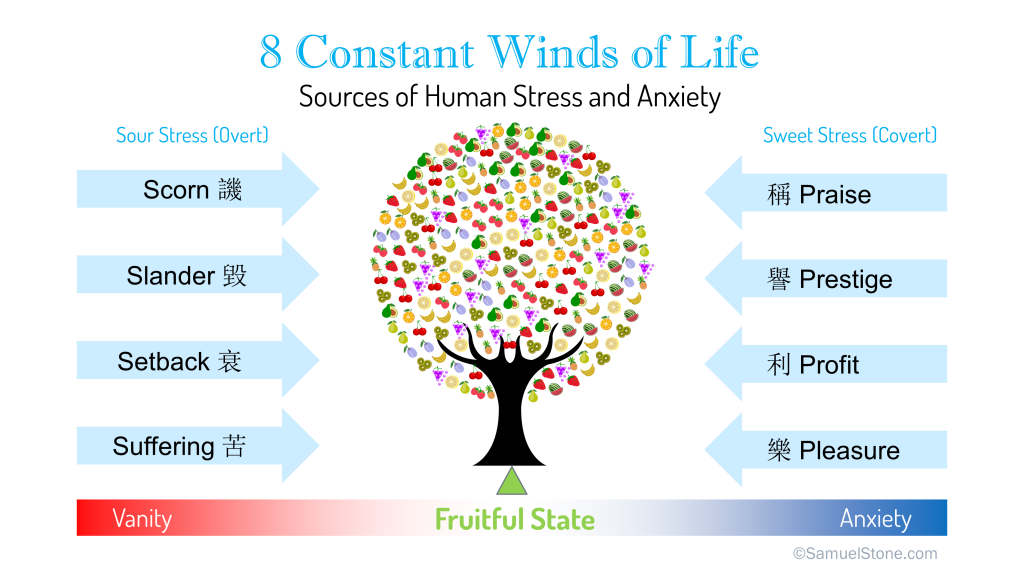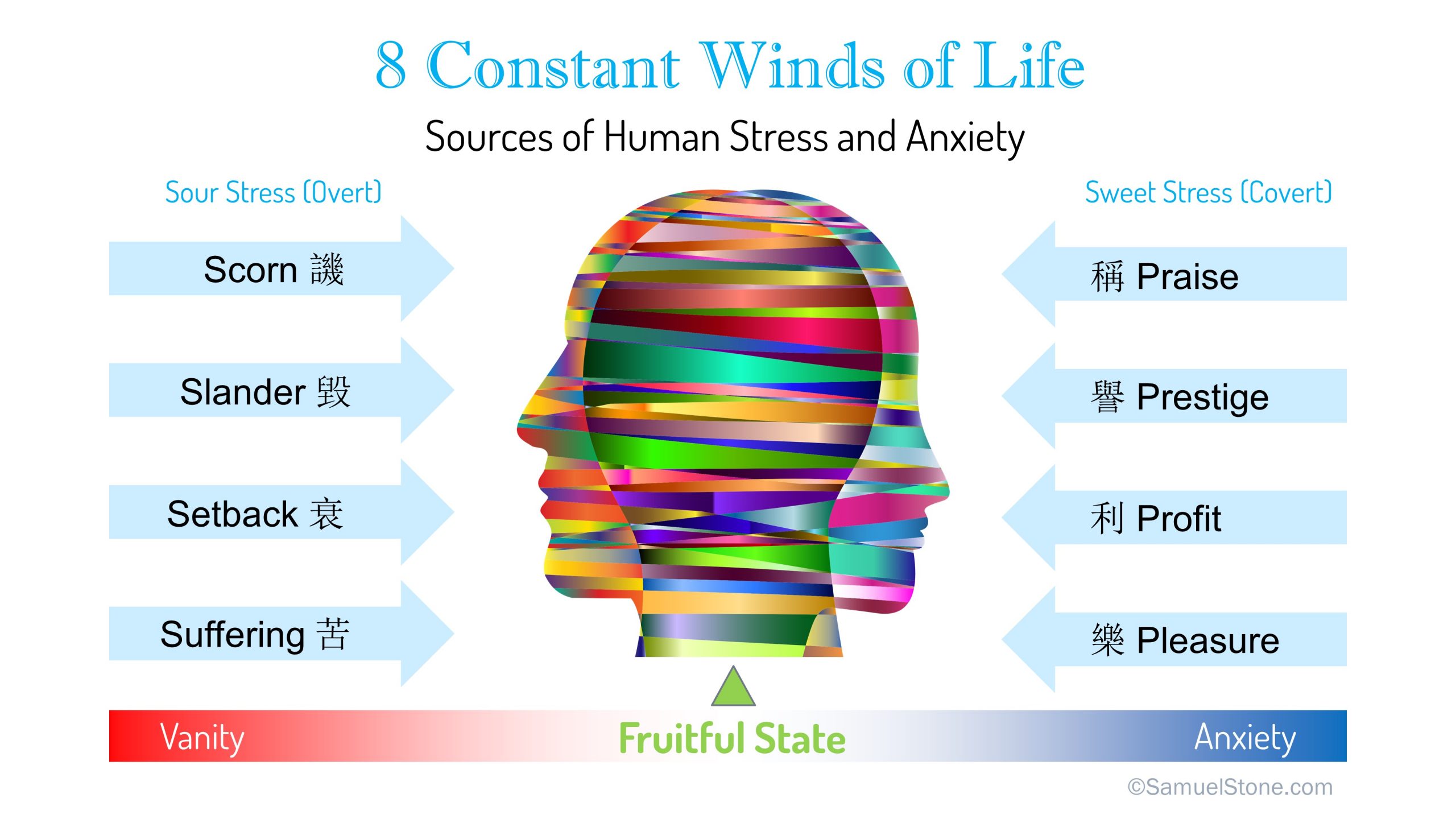There are two kinds of stress or anxiety in life—Overt Stress and Covert Stress. Overt Stress is easy to recognize because it bogs us down and troubles our hearts. I also call it “Sour Stress.”
Covert Stress is “Sweet Stress” but more insidious. It makes you feel good and proud but sabotages you from the inside. For example, we all have seen many successful people in life destroyed by their own prosperity. In other words, prosperity is equally, if not more, harmful to our spirit than poverty.
Maybe that’s why the wise King Solomon asked God not to make him too poor or too prosperous because poverty could make him break the law, and prosperity could make him forget God. He knew that the moment we forget God, life becomes vanity. He wanted to avoid Covert Stress.
Covert Stress is like sugar. You know sugar tastes good and makes you happy, but it stresses your inner organs without feeling it and could eventually cause type II diabetes or other serious diseases. Type II diabetes is known as a silent killer because it doesn’t show any symptoms for a long time. By the time it shows symptoms, it’s often too late. In the same way, Covert Stress is a silent killer of our spirit.

The ancient sages call these sources of stress the Eight Winds of Life, which constantly blow at us from eight directions. The overt winds might be like storms of life, but the covert winds might feel like pleasant breezes. Because it is constantly blowing at us, we must always maintain our spiritual fitness to stay in the fruitful state.
The top four Overt Stresses are Scorn, Slander, Setback, and Suffering. When someone scorns you, you feel belittled; when people slander you, you feel outraged; when you encounter a setback, you feel worried; and when you face suffering, you feel pain. Overall, Overt Stresses give you anxiety.
The top four Covert Stresses are Praise, Prestige, Profit, and Pleasure. When people praise you, you feel elated; prestige makes you feel successful; profit makes you feel victorious; pleasure makes you blissful. All these stresses make you proud, but if you are not careful, it could lead to arrogance. They are silent killers.
If you think you can handle these winds by yourself, you are still young. There’s a story of Su Dongpo, about whom I told you a few weeks ago. A highly gifted person in history, he was like Benjamin Franklin of 11th-century China—a statesman, a scientist, a poet, an artist, and a military strategist.
His childhood playmate, Foyin, became a zen monk. As a bright and competitive young man, he wanted to beat the monk in mediation. One day, he felt he had achieved total stillness in his meditation. He immediately jotted down a poem to illustrate his spiritual achievement and sent it to his friend, Foyin.
稽首天中天, 毫光照大千, 八風吹不動, 端坐紫金蓮
“I bow my head to the heaven within heaven;
My halo illuminates the universe;
The eight winds cannot move me;
Sitting still upon the purple golden lotus.” ~Su Dongpo
Notice he said, “the eight winds cannot move me.” The last sentence, “Sitting still upon the purple golden lotus,” means he is comparing himself to Buddha. In other words, he had achieved Buddhahood. It’s the highest achievement a zen practitioner could wish for.
He ordered his family servant to cross the river to give his poem to the monk at the monastery. Upon reading it immediately, the monk wrote a remark on the paper and sent it back. The remark said, “Breaking wind!” meaning passing gas.
When Su Dongpo received it, he was furious, “Dirty monk! How dare he ruin my beautiful poem.” Immediately, he got on a boat and crossed the river to confront the monk. A little boy came out telling him that the master was not at the monastery.
He thought, “I knew it! The guilty monk had gone hiding.” But the boy said, “My master wants me to give you this note.” The note said,
“Eight winds cannot move you, but a breaking wind blew you across the river!”
It’s not just humorous but also a lesson on arrogance. His rage reveals that he couldn’t even handle the wind of “Scorn.” He failed the test. So, his poem shows his arrogance, self-deception, hypocrisy, and spiritual pride.
How do you overcome the winds of life that are blowing at us constantly from eight directions? In this week’s scripture lesson, Jesus teaches us the secret to overcoming the overt and covert winds of life, mainly the covert winds that cause spiritual pride, which could destroy us from the inside. So today, we will learn the secret weapon against the danger of spiritual arrogance. Let’s begin!
[Hi, in case we haven’t met yet, I am Sam Stone, the Lightkeeper—you are the light of the world, and I am the keeper! (No pun intended). It’s my calling to help you shine your brightest so that God is glorified in you, and you are satisfied in God.]
The Scripture lesson today is from the Gospel according to Luke 18:9-14. [Listen to the Word of the Lord!]
He also told this parable to some who trusted in themselves that they were righteous and regarded others with contempt: 10 “Two men went up to the temple to pray, one a Pharisee and the other a tax collector. 11 The Pharisee, standing by himself, was praying thus, ‘God, I thank you that I am not like other people: thieves, rogues, adulterers, or even like this tax collector. 12 I fast twice a week; I give a tenth of all my income.’ 13 But the tax collector, standing far off, would not even look up to heaven, but was beating his breast and saying, ‘God, be merciful to me, a sinner!’ 14 I tell you, this man went down to his home justified rather than the other; for all who exalt themselves will be humbled, but all who humble themselves will be exalted.” (Luke 18:9-14).
[This is the Word of the Lord. Thanks be to God!]
This parable is the second one of the two parables Jesus told during a dialogue with the Pharisees about the kingdom of God. We covered the first one last week. The dialog began with Jesus saying,
“The kingdom of God is not coming with things that can be observed; nor will they say, ‘Look, here it is!’ or ‘There it is!’ For, in fact, the kingdom of God is ‘within’ you.” (Luke 17:20b–21).
So these two parables must be interpreted in this context. Otherwise, we could miss the profound meaning intended by Jesus.
Since the kingdom of God is “within” you, there are internal signs of the kingdom in your heart and mind.
The first parable is about a widow who persistently asks the unjust judge to give her justice. The odds are against the widow. She has no clouts nor resources, and the judge doesn’t fear God nor respect people. With that story, Jesus teaches us how to overcome overt winds or overt stresses. Luke says,
“Then Jesus told them a parable about their need to pray always and not to lose heart.” (Lk 18:1).
When we face the overt winds, we could lose heart or get discouraged. Jesus teaches us how not to lose heart. How? “Pray always,” meaning pray constantly. Paul also taught us to “pray without ceasing” (1 Thes 5:17). I’ve taught you how to pray continually by making every breath your prayer. So the secret weapon against Sour Stresses or Overt Winds is persistence. It’s like standing against the storm.
Now, Jesus tells this second parable to teach us how to handle the Covert Winds.
He also told this parable to some who trusted in themselves that they were righteous and regarded others with contempt: (Lk 18:9).
Jesus noticed some people became arrogant over their spiritual achievements. He wants us to strive for righteousness without falling into the trap of spiritual pride. To illustrate this, Jesus compares the prayers of two people—a Pharisee and a tax collector. He says,
“The Pharisee, standing by himself, was praying thus, ‘God, I thank you that I am not like other people: thieves, rogues, adulterers, or even like this tax collector. I fast twice a week; I give a tenth of all my income.’ (Luke 18:11-12).
This Pharisee thinks righteousness is all about external practices, such as fasting, giving, and keeping the commandments, but he fails to love others by being contemptuous. Jesus is criticizing his hypocrisy but not his practices. So, don’t mistakenly think Jesus was against the rituals. For example, Jesus says on another occasion,
“Woe to you, scribes and Pharisees, hypocrites! For you tithe mint, dill, and cumin and have neglected the weightier matters of the law: justice and mercy and faith. It is these you ought to have practiced without neglecting the others.” (Mat 23:23).
This verse reveals that Jesus wants to see righteousness both internally and externally—we should not practice one and ignore the other. “Justice and mercy and faith” represent love in actions. He says they are more “weighty,” meaning love is more substantial evidence of righteousness. They cannot boast about their righteousness and regard others with contempt. It’s an oxymoron and hypocrisy.
How to avoid spiritual arrogance? Humility is the key. Jesus says,
“But the tax collector, standing far off, would not even look up to heaven, but was beating his breast and saying, ‘God, be merciful to me, a sinner!’ (Luke 18:13).
The Hebrew word for “sin” means “missing the mark.” It’s an archery term for missing the bullseye when shooting an arrow. Many people today feel uncomfortable with the word “sin,” but if you realize it means “missing the mark,” it gives you a different perspective on sin.
A tax collector in those days worked for the Roman government. So, the Jews despised them because they worked for the foreign occupier—they were traitors. The Roman government gave these tax collectors a quota. They would get punished if they didn’t reach the quota.
So, they often worked hard to ensure they exceeded the quota and kept the excess for the future in case they failed to meet the quota the following season. They were also well rewarded for meeting the goal. As a result, they were pretty wealthy.
You can see that the life of a tax collector was not easy. It’s like shooting for a shifting bullseye. Many tax collectors would not even come to the temple to pray and strayed away from religion since they were treated with contempt, and they might even despise themselves for the kind of job they had.
This tax collector has the courage to come to the temple, maintain his humility, and ask God for mercy. He stands far off, meaning he doesn’t take center stage like the Pharisee. He dare not even look up to heaven like the Pharisee. His words, actions, and emotions show profound humility. Jesus said,
“I tell you, this man went down to his home justified rather than the other; for all who exalt themselves will be humbled, but all who humble themselves will be exalted.” (Luke 18:14).
Here Jesus reveals that the secret weapon against spiritual pride is humility. He went home justified means he had the kingdom within. The kingdom is the place for absolute happiness.
So, these two parables show us two inner signs of the kingdom: persistence and humility. When the overt winds blow at us, we must keep our persistence, and when the covert winds hit us, we must maintain humility.
We also need to remember that humility is easier said than done. You might have heard that Benjamin Franklin wrote down his thirteen virtues to live by when he was twenty. It’s worth reviewing it from time to time because it came out of a brilliant mind, one of the architects of a great nation. Here are Ben’s 13 virtues, or his rules for life.
1. TEMPERANCE. Eat not to dullness; drink not to elevation.
2. SILENCE. Speak not but what may benefit others or yourself; avoid trifling conversation.
3. ORDER. Let all your things have their places; let each part of your business have its time.
4. RESOLUTION. Resolve to perform what you ought; perform without fail what you resolve.
5. FRUGALITY. Make no expense but to do good to others or yourself; i.e., waste nothing.
6. INDUSTRY. Lose no time; be always employed in something useful; cut off all unnecessary actions.
7. SINCERITY. Use no hurtful deceit; think innocently and justly, and, if you speak, speak accordingly.
8. JUSTICE. Wrong none by doing injuries, or omitting the benefits that are your duty.
9. MODERATION. Avoid extremes; forbear resenting injuries so much as you think they deserve.
10. CLEANLINESS. Tolerate no uncleanliness in body, clothes, or habitation.
11. TRANQUILLITY. Be not disturbed at trifles, or at accidents common or unavoidable.
12. CHASTITY. Rarely use venery but for health or offspring, never to dullness, weakness, or the injury of your own or another’s peace or reputation.
13. HUMILITY. Imitate Jesus and Socrates.
He became one of the most remarkable men in human history with these virtues. The 13th virtue was Humility, and he said it was to imitate Jesus and Socrates.
By about sixty-five, he began to write his famous autobiography, in which he reevaluated himself according to the list and found that he had kept all the virtue except the last one—Humility.
That means two things. First, humility is not easy to maintain. Even a brilliant mind like Benjamin Franklin could not keep it. It’s a warning for all of us not to take humility lightly. Human pride is a trap easy to fall into.
Secondly, it also means if he said he had achieved humility, he was no longer humble. By saying he had not successfully maintained humility, he actually attained it. It’s like Jesus’ saying,
“For whoever wants to save their life will lose it, but whoever loses their life for me will find it.” (Mat 16:25).
Humility is also like a shifting bullseye. The moment we hit it and feel proud of it, we lose it. It’s like quantum physics. As long as you think humility is hard to maintain, you are humble.

But don’t get discouraged. It’s worth it because it keeps us from spiritual pride and helps us maintain the fruitful state.
That’s it for today. I hope you find this message illuminating as much as I enjoy receiving it from the Head Office. Until we meet again, keep your light shining brighter and broader, and harvest the fruit of profound freedom and happiness.
Amen!
Bye now!





